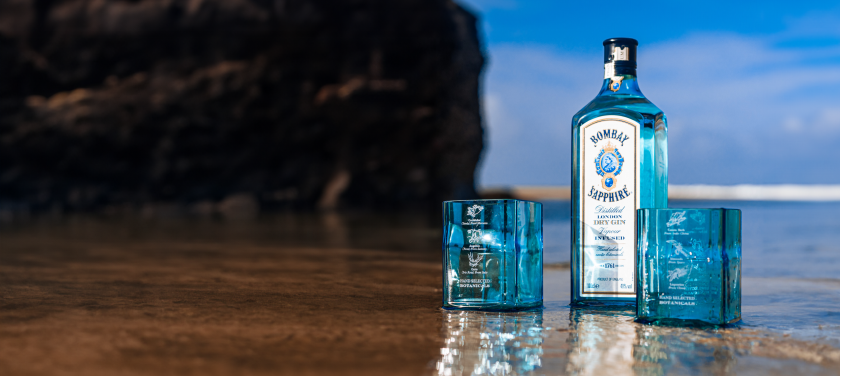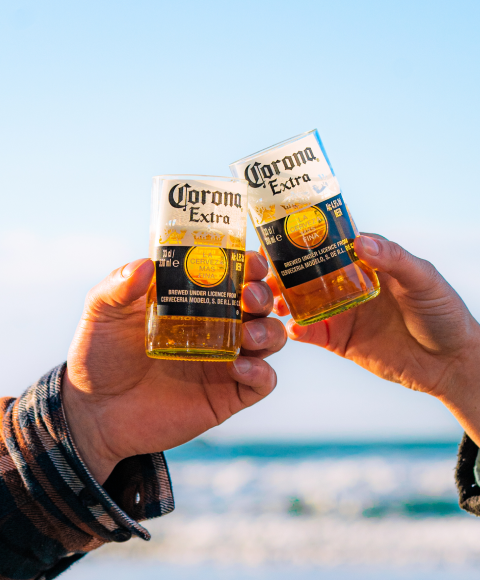SmoothEdge is renowned for upcycling waste bottles into glasses. We are often asked the question, why do you upcycle bottles? Why don't i just buy a cheap factory made glass? Are they really eco friendly? In this blog we explain why we upcycle bottles and the benefits it has on our environment and what the difference is between upcycling and recycling.
How it all started...
Back in 2017 Justin and Leah started our upcycling journey, experimenting turning waste bottles, which were far too beautiful and iconic to throw away, into glassware and tumblers. They made them for friends and family and thought they made the perfect gift. In 2019 Sam and Leah, founded SmoothEdge and started selling on Etsy and this is when we started to learn about waste bottles and the potential of turning waste into an everyday use item.
Glass waste...
Glass is 100% recyclable and can be recycled over and over again without loosing it's quality, which is great. However, glass does not decompose and this is where the first issue arose. Currently in the U.K it is estimated that up to 50% of the U.K's glass bottles and jars end up in landfill each year and across the world, it is estimated there is an equivalent of the Empire state building worth of glass ending up in landfill every 3 weeks. This is crazy for such a material that can be recycled over and over again. As glass does not decompose, it will remain in landfills forever, taking up unnecessary space which is such a shame for a material that can be used over and over again. Upcycling waste bottles into glassware helps reduce the amount of waste headed to landfills each year. We source our bottles from local bars and pubs, and from people who work at these places, take them back to SmoothEadge HQ and begin the upcycling process.
Recycling v.s Upcycling - pros, cons and differences...
Upcycling glass bottles and recycling both involve reusing glass materials, but there are some key differences between the two processes:
-
Purpose: Upcycling focuses on transforming glass bottles into new products or objects with higher value or aesthetic appeal, while recycling aims to break down the glass bottles into raw materials for manufacturing new glass products.
-
Process: Upcycling typically involves creative and artistic processes to repurpose glass bottles. They may be cleaned, cut and reshaped to create new items such as vases, lamps, or drinking glasses. Recycling, on the other hand, involves collecting used glass bottles, sorting them by colour, crushing them into small pieces called cullet, and melting them down in heat and carbon intensive factories to produce new glass products. For this to happen, the sorting process needs to receive bottles that aren't contaminated and this is when the bottles end up in landfills.
-
Energy Consumption: Our upcycling process requires less energy compared to recycling. When upcycling glass bottles, the primary energy input is labour and minimal resources. Recycling, on the other hand, involves energy-intensive processes such as crushing, melting, and reforming glass, which require significant amounts of heat and electricity.
-
Waste Reduction: Both upcycling and recycling contribute to waste reduction by keeping glass bottles out of landfills. However, upcycling offers a more direct approach to waste reduction by repurposing the bottles into new functional or decorative items. Recycling, while still reducing waste, requires additional steps and energy expenditure to convert the glass bottles into new products.
-
Environmental Impact: Our process of upcycling glass bottles has a lower environmental impact compared to a glass made from recycled materials. Upcycling minimises the need for additional raw materials and reduces the energy consumption associated with the manufacturing process. Recycling, while beneficial in reducing waste, still requires energy and resources for collection, transportation, and processing.
Why not buy a cheap factory made glass?
We are often asked, "I might as well buy a glass for cheap from the shop". This is where another issue comes in, buying virgin glass / brand new glass means you're demanding more energy and resources to make these glasses. Our upcycled glasses are extremely eco-friendly. Our particular technique of upcycling glasses comes with a Co2 equivalent footprint of over 100 times better than buying a brand new, factory made glass and if the glass you're buying is made from recycled glass, our technique is still uses 40 times less Co2.
Cheers, to a better tomorrow!





